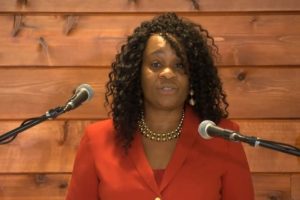Black Caucus calls for racial equity in education
By Raymon Troncoso Capitol News Illinois — September 17, 2020
State Senate Majority Leader Kimberly Lightford, D-Maywood, speaks at a news conference called by the Illinois Legislative Black Caucus Wednesday, Sept. 16 to discuss education policy. (Blueroomstream.com)
SPRINGFIELD — The Illinois Legislative Black Caucus continued to set the stage for its fall legislative agenda Wednesday, Sept. 16 calling a news conference and committee hearing to discuss education policy.
Education and workforce development make up one of four pillars on the agenda unveiled by the caucus earlier this month. The others are criminal justice reform, violence and police accountability; economic access, equity and opportunity; and health care and human services.
Caucus members are hosting a series of committees on the various pillars ahead of the fall veto session, which is scheduled Nov. 17 to Nov. 19 and Dec. 1 to Dec. 3. Caucus Chair Kimberly Lightford, a Maywood Democrat and Senate Majority leader, said Black Caucus members would like to take the whole session to address items on their agenda.
“Black people matter,” state Rep. Will Davis, a Hazel Crest Democrat and member of a House education appropriations committee, said during the news conference at Chicago State University. “The education of young black boys and black girls matters.”
Davis, Lightford and State Rep. Carol Ammons, D-Urbana, called disparity in education the most important consequence of systemic racism to be addressed by the caucus.
Robin Steans, president of Advance Illinois, a policy organization devoted to improving public education outcomes, said at the news conference, “There is no way to undo centuries of systemic racism without addressing education.”
Due to economic and resource imbalances deeply embedded in communities by legal and de facto discrimination and disinvestment, “access to high quality education from birth to career” is one of the most proven methods of leveling the playing field, according to Steans.
The afternoon committee meeting on the issue was a joint hearing of the Senate Education and Higher Education committees.
Advocates testified that income, health outcomes and crime rates of a given area can all be tied to the availability and access to quality education, as well as other factors such as accessible and affordable child care and after-school services. In Illinois, Steans said, census tracts with a high percentage of Black residents tended to have schools that received fewer resources, had more vacant teacher positions and fewer counselors than other communities.
Potential actions to reverse these trends include, according to advocates, significant financial investment to provide affordable child care, pre-kindergarten education, literacy programs and other measures focused to give preference to low-income students and families that need resources the most.
Lightford also spoke to the importance of education and gave a tearful response when asked about her inspirations as a child.
“I come from an abusive home and I don’t know that I had inspiration, I just knew that I needed to pray,” she said.
Lightford said her mother, grandmother and great-grandmother were all homemakers with limited education. Thanks to “some of the best teachers” in grammar school who looked like and could relate to her, as well as the support of her mother to receive a quality education, Lightford said, she was the first in her family to receive a college degree.
During the news conference, Davis said the potentially expensive measures will need the support of his colleagues outside of the Black Caucus.
“While they’re saying they’re with us now, when the rubber hits the road we’ll see exactly where they are,” he said, without naming any specific colleagues. “They just have no desire to see the equity that needs to come about by assisting the black community.”
Democratic legislative leaders Senate President Don Harmon, D-Oak Park, and House Speaker Michael Madigan, D-Chicago, have both issued public statements in support of the Black Caucus’ legislative agenda.
Lightford said she was “encouraged” by the support for the agenda she’s seen outside of the Black caucus.
“I think change is not something always easily and readily received… You have to have courage to make a change,” she said.
The need to inform their colleagues is one of the reasons the caucus has planned eight subject matter hearings — two for each pillar — in the General Assembly ahead of the fall veto session.
“It’s our responsibility as Black Caucus members to explain that (Black) experience to our colleagues via experts, data, research, knowledge,” Lightford said. “The things that we know ‘cause we live it, we need to make sure they understand.”
The Sept. 16 Senate committee heard the testimony of experts on early childhood education funding and access to early literacy programs. Witness organizations included the Ounce of Prevention Fund, Voices for Illinois Children, Illinois Action for Children and Advance Illinois.
Witnesses agreed on the prevalence of child poverty in Illinois, its crippling effect on youth development and the inherently expensive nature of any solution to existing disparities. Experts called on legislators to make difficult choices on funding, and some suggested centralizing programs and diverting public funds from affluent areas to meet projected costs.
The caucus has already called two hearings on criminal justice, including one on police accountability and public safety, which took place the same day the caucus unveiled its agenda. The second, on sentencing reform, took place on Sept. 15.







